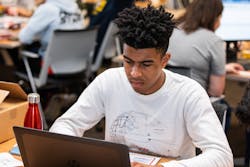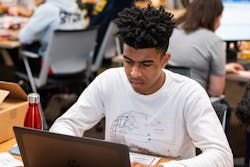ComEd Offers Virtual STEM Education to Community
As stay-at-home practices and social distancing measures transform our reality, the push for innovation and digitalization is only increasing. Commonwealth Edison (ComEd), serving over four million customers in the city of Chicago and most of Northern Illinois, has recognized the need to invest heavily in science, technology, engineering, and math (STEM) education in the communities it serves.
In recent years, ComEd has developed STEM programs to spark an early interest in STEM concepts, encourage a future energy mindset, and prepare a skilled energy workforce of the future with engineer-mentored curricula and professional development opportunities. In light of COVID-19, ComEd is quickly transitioning its STEM programs to a virtual environment to provide learners with a remote opportunity to develop the skills they need to build a greener, more sustainable, and more resilient future.
Pandemic planning is part of the electric utility's disaster preparedness when it comes to grid infrastructure, but ComEd's work to mirror this level of preparedness in STEM programming speaks to a larger focus on community resilience. ComEd tailors each program to community need when it comes to mentorship, program length, and level of student readiness. As a result, the transition from in-person programming and large-scale events to virtual mentorship and online scholarship competitions was able to take place quickly.
Virtual Teaching, Mentorship, and Projects
So how does virtual teaching work, especially for complex, technical, energy-related subjects? The value of long-term projects, like ComEd's STEM program team's ongoing collaboration with HFS Chicago Scholars on the Create a Spark program, is demonstrated by the relationships that students develop with ComEd engineers and the foundation of STEM knowledge that they build on each year. ComEd created a virtual model that uses both pre-recorded lessons and live sessions. This multimodal teaching method includes at-home preparation from students, live session discussions, and guided project development.
By May 2020, students in ComEd's Create a Spark program could watch ComEd engineers teach virtual lessons on the forms and sources of energy, electricity generation, and transmission while answering questions embedded in the lecture. After completing these lessons, students can join live sessions with their peers to discuss climate science, play digital games to build concept confidence, and complete "lab" activities under the guidance of ComEd engineering mentors.
To help mentors adapt to a virtual environment, ComEd's STEM team deployed a series of mentor competency goals to track the development of the engineers' engagement with their students virtually. The team actively monitors adaptability, ensuring that mentors are adjusting to delivering information to participants under the new format. Mentors are encouraged to provide feedback and consult with students to achieve project goals on a regular, remote basis. Through this goal model, mentors shape the vision and strategy of a project, developing a clear vision for project outcomes and strategy to ensure that participating students understand the crucial components of each project.
In past years, student participants in ComEd STEM programs could physically divide into teams to develop in-depth technological projects involving problem-solving and energy innovation in a series of in-person sessions. Now, the projects have been reconfigured so students can collaborate in an online environment. A great example of that is the STEM Never Stops! initiative. The goal behind this program is to emphasize how crucial it is to continue STEM learning even though students cannot meet in-person to work on projects.
STEM Never Stops! was launched in spring 2020 as a virtual series filled with engaging STEM projects for both students and their families. Every two weeks, ComEd releases a new project. In series one, students engaged in a project called Candy Collector. Through this activity, ComEd engineers focused on renewable energy integration taught students the basics of energy, non-renewables, and renewables using candy.
Candy Collector encouraged students and parents to learn together, thinking about the bigger picture of energy consumption. Using two types of candy, participants learned to track recovered and discarded energy, graph their findings, and submit a video to the STEM Never Stops! email account that illustrated what they had learned. By using various methods for student engagement and project submission, the team has been able to mirror the motivation and sense of accountability students would get from in-person project development.
Long-term ComEd programs like Create a Spark and the ComEd Power Challenge typically conclude with a science fair competition and award ceremony for winning projects. This year, ComEd's Power Challenge concluded in June with a virtual awards ceremony. Students viewed a slideshow of pictures from sessions and quotes from mentors about their teams. They received a congratulatory address from ComEd leadership, acknowledging the hard work that went into their projects.
To maintain the students' spirit of continuous improvement and appreciation of the emerging opportunities for engagement in STEM, the ceremony included information on what the students can do in their future careers if they continue to pursue STEM skills, concepts, and programs.
A student who participates in these programs may very well go on to graduate from a STEM-focused program in college, obtain an internship in STEM, or even go on to become a ComEd engineer and mentor someday. These virtual programs represent a tangible method for developing and continuing a path in STEM in a time when learning uncertainties abound.
The new restrictions imposed by COVID-19 have changed much about our daily realities. Still, they have not changed the goals of ComEd's STEM programs: to continue to combat the effects of climate change through promoting innovation, to instill a sustainable future energy mindset in the next generation, and to help ensure that the workforce to come is better educated, better prepared, and more likely to improve our world.
About the Author
Aleksi Paaso
ALEKSI PAASO ([email protected]) is director of distribution planning, smart grid and innovation at ComEd, where he is responsible for distribution planning activities, distributed energy resource (DER), and smart grid strategy and project execution. He is a senior member of the IEEE and vice chair of the IEEE Power & Energy Society’s (PES) Industry Technical Support – Leadership Committee (ITS-LC). He holds a Ph.D. in electrical engineering from the University of Kentucky.
Daniel Kushner
Daniel Kushner is Director of Resiliency Strategy at LUMA Energy. He holds a bachelor's degree in history from Johns Hopkins University and a PhD in political science from Brown University.
William Hanigan
William Hanigan is manager of Smart Grid Programming at Commonwealth Edison (ComEd), the largest electric utility in the state of Illinois. Hanigan leads planning, development, and execution of ComEd STEM Programs, creating the vision for how to prepare engineers of tomorrow for present and future challenges. Hanigan formerly served as director of operations at HFS Chicago Scholars, was an employee of Chicago Public Schools and holds a master’s degree in Special Education and Teaching from the University of Illinois at Urbana-Champaign.


